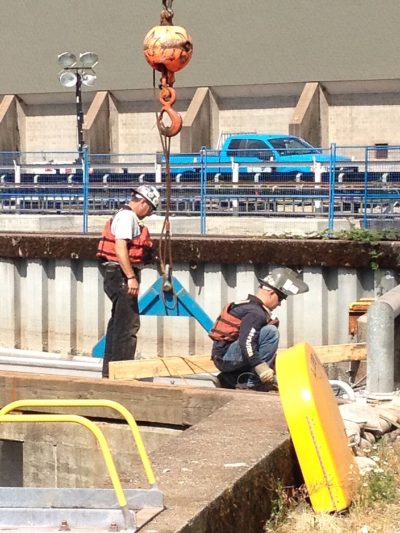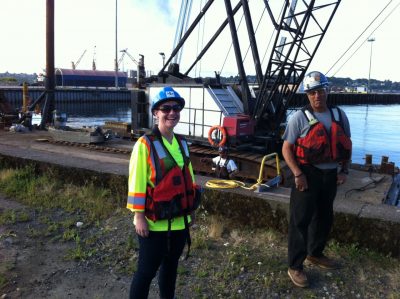 Cheryl Peters, CIHR Postdoctoral Fellow, Health Sciences
Cheryl Peters, CIHR Postdoctoral Fellow, Health Sciences
by Ariel Root
When she saw workers without proper health and safety protection, Cheryl Peters found her niche in Industrial Hygiene, helping to prevent workers’ diseases and to improve workplaces. She assumed she would end up in the oil and gas industry, but didn’t expect developing a keen interest in a variety of very high, and very unique occupational exposures. Peters declares that her career path has stemmed from a combination of necessity, circumstance, and luck, “but I never thought that I would be an academic researcher.”
Peters came to Carleton University in 2015, and is now a Canadian Institute of Health Research Postdoctoral Fellow in the Department of Health Sciences, with a cross-appointment at the Institut national de la recherche scientifique (Institut Armand-Frappier) in Montreal. Her program of research at Carleton focuses mainly on epidemiological studies of men’s occupational kidney, skin, and prostate cancers.
 “In Canada, more than 80% of the jobs with dangerous or hazardous exposures are still held by men…and this is one reason that men are still getting more cancer than women,” she explains, especially for both occupational kidney and skin cancers. More than 90% of outdoor workers are men.
“In Canada, more than 80% of the jobs with dangerous or hazardous exposures are still held by men…and this is one reason that men are still getting more cancer than women,” she explains, especially for both occupational kidney and skin cancers. More than 90% of outdoor workers are men.
But there’s also an interesting consideration when reviewing screening frequency for prostate cancer—worker willingness. Are there differences by job? How does a worker’s job influence his or her willingness to seek cancer screening? Peters explains that it seems like there’s more than just socioeconomic status or education at play here, and that comparing screening willingness to job type is more like a job culture examination.
Because her main research interests are occupational and environmental epidemiology, and carcinogen exposure assessment, Peters is also an Affiliated Scientist of the Occupational Cancer Research Centre at Cancer Care Ontario, and the Occupational Exposures Lead Scientist at CAREX Canada.
CAREX Canada is a multidisciplinary team of researchers based at Simon Fraser University, which works in collaboration with researchers at University of British Columbia, University of Victoria, Carleton University, and the Occupational Cancer Research Centre based at Cancer Care Ontario. Peters has been involved in the CAREX project since its inception in 2007, where she observed the levels of exposures to carcinogens at workplaces.
More recently, however, her contributions to the project have been related to knowledge translation of the collected data to help researchers, practitioners, and policy makers to reduce carcinogen exposures at work. “It’s all about getting the numbers into the right hands,” she says.
 Peters hosts targeted webinars, and works directly with lawyers and unions, performing case review or in-person training related to specific occupational hazards. In some cases, Peters has worked with First Nations communities, performing tutorials on how to use the occupational data collected. Peters expresses the importance in tailoring the research to best benefit the users.
Peters hosts targeted webinars, and works directly with lawyers and unions, performing case review or in-person training related to specific occupational hazards. In some cases, Peters has worked with First Nations communities, performing tutorials on how to use the occupational data collected. Peters expresses the importance in tailoring the research to best benefit the users.
But Peters also acknowledges the hurdles from insufficiently specified data. “We need measurements taken in various environments and occupations.” A lot of what has been recently recorded is now privately owned, and therefore not accessible.
Peters loves the practical components of her research—manipulating numbers, data, and statistics—as well the application and translation of these models and analyses into practice. “I like doing research that is relevant to the workers… and I believe that quantifying [these hazards] can lead directly to policy change that can affect all workers.”
In these cases, Peters acknowledges the importance of applying a new way to look at the research. Having been able to go into the field, and talk directly with workers, Peters learned invaluable lessons from incorporating novel opinions and considerations. “I thought I would struggle to find people, or get a lot of pushback, but I didn’t… lots of people on worksites are passionate about their health… and were able to highlight other workplace hazards.” Peters expects the CHAIM Centre will similarly bring new angles and considerations to her research. “I love the interdisciplinary aspect… connecting with people I may not have otherwise.”
While at Carleton, Peters will continue to examine gender differences in workplace cancer, and build further understanding of the influences of workplace culture. She also expects to identify new sources of environmental and occupational cancers, but acknowledges the current challenges from insufficient data. Her CIHR post-doctoral fellowship will enable her to conduct field explorations, as well as to attend additional training courses, and to translate gained knowledge back into the working communities.
Talking to real workers and identifying their workplace concerns has left a lasting impression on Peters. “It’s long been accepted that men live shorter lives [than women]. But I think that a lot of that is related to exposures at work.” For Peters, this inequity is worth investigating, highlighting, and changing for future generations.
For Dr. Peters contact information, go here.